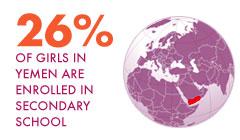
November 9, 2012 | Education, Violence Against Women
International Day of the Girl: A Call to End Child Marriage
By Ashley Bush
On October 11th, the UN celebrated the first International Day of the Girl.
“Gender equality must become a lived reality,” Michelle Bachelet, the Executive Director of the UN Women, recently stated. In order to get closer to making gender equality a reality, on December 18th, 2011, the UN General Assembly designated a day to observe and empower the human rights of girls.
The facts tell us everything. By 2015, females will make up 64% of the world’s (adult) population who cannot read. Only 30% of girls in the world are enrolled in secondary school. One in seven girls in developing countries is married off before the age of 15.
To spur economic growth and eradicate extreme poverty, the UN recognizes the critical need to arm girls with the tools for a better future that allows them to be active participants in society.
The first International Day of the Girl focused on child marriage with events all around the globe focused on this theme. The Day of the Girl included a parliamentary debate in Malawi on child marriage and radio debates in South Sudan. There were even text message discussions among young people in Uganda.
At the UN Headquarters, a high-level panel took place featuring Archbishop Desmond Tutu and representatives from UNFPA, UNICEF, and UN Women. The panel emphasized education as a tool to protect girls against being married without their consent, an instrument to liberty.
In many regions, parents arrange their daughter’s marriage without the consent or even knowledge of the girl. One day, she may be playing at home with her siblings, and the next, she is married to an older man and sent to live in another village with his family, schooling no longer an option as so often the majority of domestic responsibility remains with the woman. Furthermore, child brides are more likely to experience sexual abuse, and with that, a vast range of health problems; married girls have a higher risk of contracting HIV because they often marry an older man.
Secretary General Ban Ki-moon urged governments, community and religious leaders, civil society, and families to “let us do our part to let girls be girls, not brides.” Additionally, he honed in on girls’ education: “When they are able to stay in school and avoid being married early, girls can build a foundation for a better life for themselves and their families.”
In poverty-stricken households, girls are almost twice as likely to marry before 18 than girls in higher-income households. Alternatively, by educating girls, families allow their children to become active members of society, increasing both the family’s as well as the girl’s chance for a better future. Education is the key to breaking the vicious cycle of child marriage.
If present trends continue, 100 million girls will marry over the next decade--that’s 25,000 girls married every day for the next 10 years.
Despite laws to prevent child marriage, the practice has remained mostly constant in the past decade throughout developing countries. The UN recently released a report, Marrying Too Young: End Child Marriage, which details and identifies geographic “hotspots” that have high numbers of girls at risk of child marriage. Furthermore, the report calls to expand prevention programs and address the root causes of the practice.
At the UN panel, Anju Malhotra, head of UNICEF’s Gender and Rights, emphasized that “through global commitments, civil society movements, legislation and individual initiatives, girls will flourish in a safe and productive environment…We must accelerate progress and dedicate resources for girls to claim their rights and realize their full potential.”
UNFPA announced an additional $20 million investment over the next five years to reach adolescent girls in 12 countries with high rates of child marriage.
The International Day of the Girl on October 11th not only raised awareness internationally, but also brought together high-impact organizations acting to expand programs and uniting under a common goal: to empower girls and to educate their families to prevent child marriage.
Fatou Bensouda, the Prosecutor of the International Criminal Court, powerfully emphasized during her speech on the Day that “the women of the future, the young girls of the world, should not be deprived of their fundamental human right to play and learn and enjoy being children.”
By putting an end to child marriage, we are one step closer to gender equality becoming a lived reality.
Ashley Bush is a writer for Women in the World Foundation. She is an assistant writing aid to President Spar of Barnard College, and the co-creator of the webseries Route by Route.